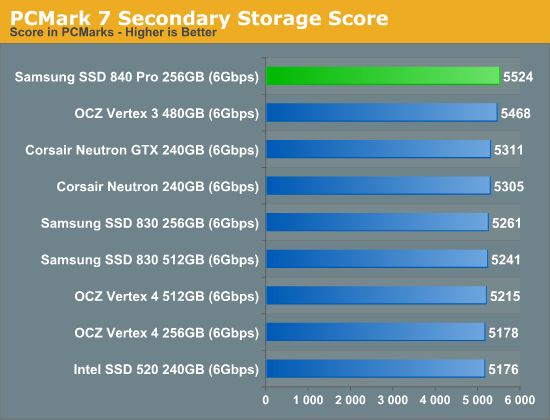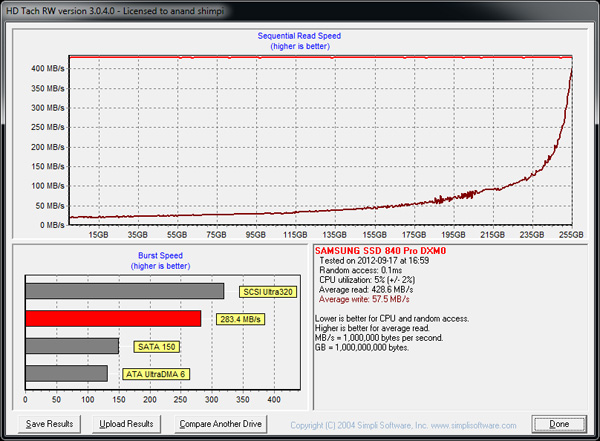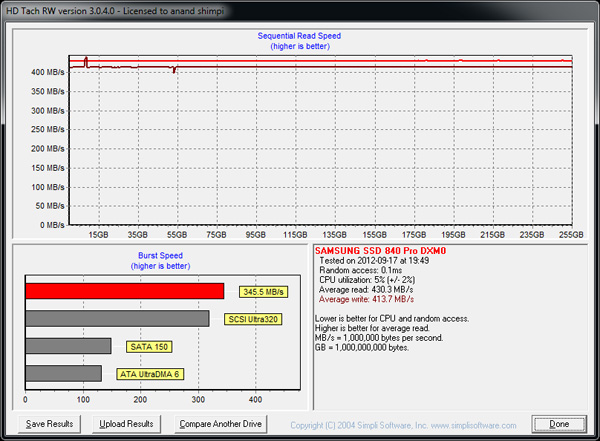Samsung SSD 840 Pro (256GB) Review
by Anand Lal Shimpi on September 24, 2012 7:00 AM EST- Posted in
- Storage
- SSDs
- Samsung
- Samsung SSD 840
PCMark 7
PCMark 7's secondary storage benchmark does little to show us differences between modern, high-performance SSDs as everything here scores within 5% of one another - but that's the point. For most mainstream client uses you'd be hard pressed to tell the difference between two good 6Gbps SSDs. Worry more about cost and reliability than outright performance if you're considering an SSD for a normal machine. Anything you see here will be much faster than a mechanical drive.

Performance Over Time & TRIM
Over time SSDs can get into a fairly fragmented state, with pages distributed randomly all over the LBA range. TRIM and the naturally sequential nature of much client IO can help clean this up by forcing blocks to be recycled and as a result become less fragmented. Leaving as much free space as possible on your drive helps keep performance high (20% is a good number to shoot for), but it's always good to see how bad things can get before the GC/TRIM routines have a chance to operate. As always I filled all user addressible LBAs with data, wrote enough random data to the drive to fill the spare area and then some, then ran a single HD Tach pass to visualize how slow things got:
The 840 Pro is really no different than the 830 when it comes to how low performance can get in the worst case scenario. Client users will want to keep some free space on the drive to avoid getting backed into this type of a performance corner. TRIM will obviously help and looks to be fully functional on the 840 Pro:












96 Comments
View All Comments
Kristian Vättö - Wednesday, September 26, 2012 - link
We managed to run all of our normal tests (i.e. the stuff needed for this review) and Anand was simply running some enterprise tests to see how the 840 Pro behaves there. This is quite normal testing for us, so it's not like we were trying to break the drive on purpose.A new drive is already on its way to Anand, plus I have the regular 840.
Benny_k80 - Friday, November 16, 2012 - link
What happened to the information about the defect drives? Did Samsung have any explanation?hasseb64 - Thursday, September 27, 2012 - link
Why the big differens between claimed and tested power consumption?Roughly 3 watts is very high in a ultrabook, are there any sub 1 watt SDD left out there?
Per Hansson - Friday, September 28, 2012 - link
hasseb64: look at the previous comments regarding DIPM & EIST.There might be some problems with the testing performed, lack of DIPM can have a huge power consumption difference...
The sampling interval of the device they use to measure power consumption is also very important since SSD's switch power states very very frequently...
GullLars - Friday, September 28, 2012 - link
I just have to say, this drive impressed me. If the stability is the same as 830 Samsung has a real winner here.One of the things i note here is something i've noticed the lack of in other SSDs earlier, and been vocal about. Since the SSDs have large DRAM buffers, they should easily be able to use it as a read-ahead for small block sequential and low QD sequential reads. Going by the iometer 128KB seq read and ATTO graphs, i'd say this is exactly what samsung has done.
It also seems they have implemented a decent sized write buffer to do the same for writes. Let's hope it's implemented safely so you don't loose or corrupt data on powerloss.
I've been recommending 830 lately, and if early reports (after the first month) indicate 840 pro is stable, it will be the my recommendation if the prices are decent.
With the maxing of SATA 6Gbps getting close (or is already here?), it's now time for SATA Express or just native PCIe SSDs.
thefizzle656 - Monday, October 1, 2012 - link
Hey Kristian between the 840 Pro and the M5 Pro which would you choose? It would be going into a 2011 MBP for both OS X and Boot Camp. I'm looking to get a 512 GB drive and it looks like the M5 Pro is going to coming in at less than $450, so my thought is to get the drive that is the cheapest. Please let me know. Thanks.chrcoluk - Friday, October 12, 2012 - link
Whilst these benchmarks all look pretty sweet, they ultimately dont mean much.In real world usage I expect a 840 PRO wont feel any faster than my 830 at all, and the fact they sweep aside a quickly driving drive as not relevant is a worry.
Whilst performance is important, reliability is something I value higher. Also value for money shouldnt be ignored either, so in my opinion the best thing about this drive is it is making the 830 cheaper.
Also the non pro 840 uses TLC which I suspect reduces life expectancy and increases CRC error rates, I would avoid the normal 840 completely whilst MLC drives are still on the market.
So thanks for the review and thanks for the price drops samsung so now I can buy another 830 this time for my laptop :).
dgigibao - Wednesday, October 17, 2012 - link
Several times you recommend the Samsung 830 for Mac OSX users for the same kind of controller whitch Apple in puts in their factory SSD. Whould would recommend 840 Pro for Mac OSX users to?Benny_k80 - Tuesday, November 13, 2012 - link
What happened to the information about the defect drives? Did Samsung have any explanation?FCss - Wednesday, November 14, 2012 - link
I was about to buy this SSD today and just went through the article again and saw the update about the second drive dying. I hope it's not a design flaw.